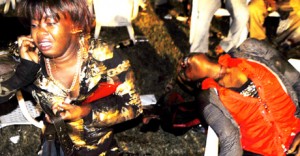Bomb blasts rock Kampala, scores dead
By Our Staff Writer – 12th-18th July 2010
 It was supposed to be a night of sporting celebration across the globe as the FIFA world cup drew to a dramatic close in South Africa. Someone, somewhere, however, had other sinister ideas and ruined the party; at least for many Ugandans. On the same night of the world cup finals, the Ugandan capital Kampala was rocked by multiple bomb blasts that ripped through Kampala’s skyline. Some sources say blasts claimed the lives of up to 40 people. Uganda’s Inspector General of Police Maj. General Kale Kayihura, however, said the death toll so far stood at approximately 23 fatalities.
It was supposed to be a night of sporting celebration across the globe as the FIFA world cup drew to a dramatic close in South Africa. Someone, somewhere, however, had other sinister ideas and ruined the party; at least for many Ugandans. On the same night of the world cup finals, the Ugandan capital Kampala was rocked by multiple bomb blasts that ripped through Kampala’s skyline. Some sources say blasts claimed the lives of up to 40 people. Uganda’s Inspector General of Police Maj. General Kale Kayihura, however, said the death toll so far stood at approximately 23 fatalities.
Early reports indicate that the bombs went off at Kampala Rugby Club, at the Ethiopian Village in Kabalagala, and at a yet to be established location in Ntinda; all suburbs of Kampala. At Kampala Rugby Club, many of the dead are said to have been football fans who were happily watching the FIFA world cup final between Spain and Holland that had been laid on courtesy of The New Vision publications Ltd.
Coming on such a momentous day, it is very likely that the majority of the people who were killed in the other bomb sites [Ntinda and Kabalagala] were also football fans. Questions are however, already being asked about who could have been behind the deadly attacks.
In an interview with Reuters, Maj. General Kale Kayihura seemed to suggest that Somali Islamic militants from Al Shabab were the prime suspects behind the attacks in Kampala. Uganda is one of the African countries that sent its troops into Somalia under the auspices of the African Union [AU] peace keeping mission; a move that had been vehemently opposed by hard line Islamic militants in Somalia like Al Shabab.
Opposition parties in Uganda led by the Forum for Democratic Change [FDC] had also opposed the Somalia deployment at the time arguing that Uganda’s strategic interests in that deployment had not been clearly spelt out by the government for thorough debate. The then State Minister for Defence M/s Ruth Nankabirwa responded to those opposition criticisms and said “…not even the walk out by the opposition MPs would stand in the way of the Somalia deployment. We will be there within two weeks from now”.
Soon after Uganda deployed its soldiers into the Somali capital Mogadishu, Al Shabab warned President Museveni’s government in Kampala that it would punish Uganda for its involvement in Somalia’s internal affairs. The government responded by ordering the registration of all Somali nationals already in Uganda as well as those coming into Uganda for the first time.
Yes, at this stage, no one knows for sure who was behind the attacks on Kampala. But if Al Shabab were indeed found to be the organizers of this deadly triple bomb attack on Kampala, then Museveni’s government will have miserably failed to protect innocent Ugandans from fundamentalists who speak the language of violence.
It is an incident that is likely to cause a serious review of security in Uganda the results of which could change the lives of Ugandans for a very long time. Secondly, given that the opposition parties led by FDC had also opposed the Somalia deployment, these bomb attacks are also likely to re-ignite a political blame game over the government’s decision to send Ugandan troops into Somalia.
![]()

